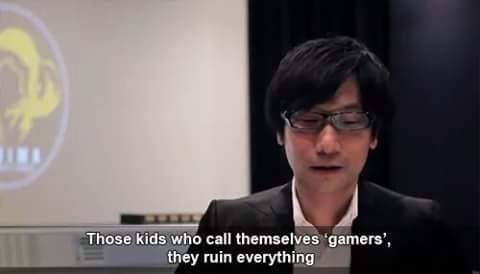[OPINION] Some Gamers Need to Grow Up
PREAMBLE: I wrote this article three years back, during my run with Girls Got Game, when we still had a website of our own. Three years later, I find that my opinions on the matter haven’t changed much at all. As such, I’ve decided to blow the dust off of the thing, make some revisions, and post it up again.
So imagine yourself having a particularly agonizing experience with Candy Crush. You’ve got two moves left, and three Evil Jelly Packs standing in between you and Sweet Redemption. After praying for a sign, divine inspiration hits, and you complete the level with two decisive sweeps.
Feels good, bro. Now imagine a friend of yours – likely someone who has been watching your progress with bated breath and quite possibly sympathizing with your pain – praising you for it. “Wow, you’re such a gamer!” Now, imagine this moment of victory interrupted by a derisive side comment from a nearby “real” geek: “As if.”
If that scenario doesn’t fit, imagine yourself discussing one of your favorite titles with other people, be it in your classroom, or at a bar, or on an online forum. What could have been a fun and interesting discussion that had the potential to enrich all of your lives is totally derailed by any one of the following comments, or a variation of any of the ones that I’ll list below:
- “You’re a total n00b.”
- “Yuck, you have bad taste.”
- “R u Tumblr”
- “R u SJW?”
- “Filthy casual.”
Real mature, eh? Unfortunately, many people who style themselves as “real gamers” often talk like this. It’s structured around the belief that you are only a gamer if you play a certain kind of game, on certain kinds of platforms (take, for example, any of the number of consoles available for consumers today, or the good old Mac or PC). Just what is a “gamer” supposed to be anyway? Is it not supposed to be someone who enjoys games enough to spend a decent amount of time on them?

At this point, some of you might be wondering why this is even an issue. People can always stay in their own corners and stick with the games and the gaming company that they like. Live and let live, let bygones be bygones, you keep your opinions and I’ll keep mine. In the meantime, our favorite companies will keep rolling out amazing titles, suited to our individual tastes. Everyone wins.
The trouble with this is that more often than not, the “tastes” of today’s gamers are pretty poor. That should be obvious in the sad proliferation of overly repetitive or downright useless segments of gameplay, irritating stereotypes, tired rehashes of the same set of plot lines, and sloppy writing that we see on the market.
Gamers, please excuse my French: a lot of you need to grow the fuck up. We ought to look for fair gender and racial representation (where it’s due, mind you, and with proper consideration for the context of the game – aka, let’s all stop bitching about Witcher 3 and its “lack of racial representation”), well-written stories and intelligent social commentary in our video games. Heck, we can even ditch all of that in favor of a game that’s just REALLY well done, and doesn’t completely destroy our brain cells – or, if they do, they do it in the most glorious ways possible. Most of us, however, don’t bother with any of that. Because most of us don’t bother, game designers are going to keep putting out the same things because they think that it’s what the majority wants. If the majority, however, had better taste… well, you get the idea.
The development of good taste means a change in attitude. Here are three traits that definitely need fixing.
A Vehement Need to Possess “Gamer Street Cred”.
Any geek who happens to be a little left of the “normal” gamer geek (straight, male, 16-30 years old, plays console and/or PC games) has at least one story of a Close Encounter with Hardcore Geek Kind, where they have found themselves “tested” for signs of intelligent life. The criterion for “intelligent” often constitutes extensive knowledge of the trends in the gaming community, an impressive repertoire of already played games and a set idea of what constitutes for a “real” game (again: PC and console) versus what is “fake” (i.e. app games, or heck, any game that just doesn’t suit their personal idea of what’s good). Not fitting the bill often results in stares and judgmental comments and – in a distressingly large number of cases online – insults, trolling, and legitimate threats to the online security (and sanity) of the targeted parties.
Nobody gets cookies for being an asshole, guys. Places like Tumblr have become cesspools for netizens claiming to fight for all sorts of “human rights” without even bothering to study the underpinnings of issues like race, gender and social class in the first place. Some folks in #GamerGate also want a lot of their own to stop being douchebags, because the standard M.O. for most of the idiots who use the movement involves terrorizing anyone who chooses to “oppose” them. Just sayin’.
Buying wholesale into the idea that having “street cred” in geekdom is important is tantamount to beating a dead horse given how “geeky” practices are widely recognized as a part of mainstream culture now, and let’s not even bother going into why it’s just a stupid and immature thing to do. Exclusivity is the fastest way to kill a community, and pretty much ensures a lack of growth. If all gamers continue to think the same way (that is, stupidly), expect all games to play the same way (that is, stupidly).




